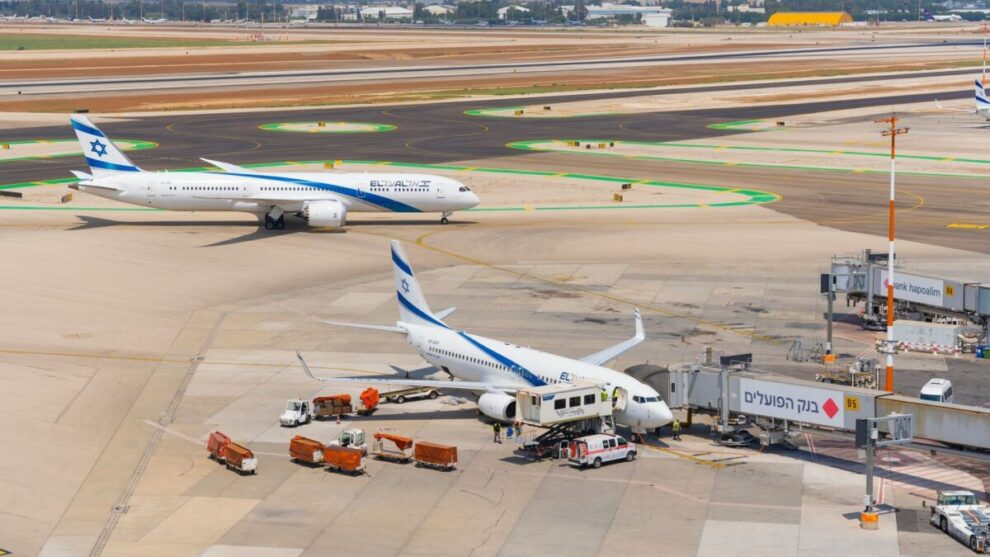FedEx Express joined a long list of airlines that have sharply reduced international flights into Israel after a large attack by Hamas insurgents from Gaza over the weekend, but other cargo operators are trying to keep air cargo traffic flowing during the war despite the risk in the air and at Tel Aviv airport.
UPS late Monday also said it had stopped flying to Israel.
“We are closely monitoring the situation and have temporarily suspended flights into and out of Israel. Service disruptions may occur,” the express logistics provider said in a statement to FreightWaves. UPS added in a new service alert that it has contingency plans in place to move shipments that are already in Israel to their destinations as quickly as it is safe to do so.
Civil aviation authorities in the U.S., European Union and Israel all urged airlines to use caution in the region’s airspace but have not restricted flights. Israel’s aviation regulator advised carriers to review security and threat information and to carry more fuel, and they changed some flight paths to the capital.
Aircraft tracking site Flightradar24 shows an average delay of 42 to 60 minutes for flights at Tel Aviv airport.
Israel’s air cargo market is relatively small, with about 300,000 to 400,000 metric tons of goods carried annually, according to Trade and Transport Group, a logistics consulting firm.
FedEx has suspended inbound and outbound flights on Monday and Tuesday to the country while it monitors the situation, it said in a service bulletin. All shipments destined for Israel will be safely held in company facilities.
“Delivery of shipments already in Israel will be performed where safe and possible,” the message said.
Challenge Group, Israel’s only all-cargo operator, will continue to operate to Tel Aviv through its hub at Liege Airport in Belgium, said Gianluca Marcangelo, head of industry relations and marketing, in an email. Challenge Airlines, which operates under licenses in Israel, Belgium and Malta, has four Boeing 747-400 freighters and three 767-300s. Live tracking data showed one of the 747s on the ground in Tel Aviv on Monday, but its next destination was not available.
The company “is a key enabler in supplying the country [Israel] with needed commodities and supporting the local economy. … We will continue to operate without compromising with the safety of our staff and assets,” Marcangelo said.
A Boeing A300-600 freighter operated by DHL Express arrived in Tel Aviv Monday evening from the express carrier’s hub in Leipzig, Germany. Two DHL 757 freighters were scheduled to arrive and depart at night, according to Flightradar24.
Stan Wraight, co-founder and CEO of aviation advisory firm SASIWorld, said that if the conflict continues, he expects an influx of cargo charters to replace the cargo capacity lost on passenger aircraft.
OPS Group, a member-supported information exchange for pilots, air traffic controllers and dispatchers, is warning airlines to stay away from Israeli airspace because of the high risk that an aircraft could be mistakenly shot down. It pointed to the Malaysian Air flight shot down over Crimea by Russia-supported Ukrainian separatists in 2014 as an example of the risk to civil aviation in conflict zones.
The situation is far more dangerous than the sporadic rocket attacks on Israel that are the norm. And the risk extends beyond a rogue missile strike on a flight, OPS Group said. Other risks include debris from air defenses, GPS spoofing (when someone uses a radio transmitter to send a counterfeit GPS signal to a receiver antenna to override a legitimate satellite signal) that can cause an aircraft to go off course and into the path of danger, false alerts from ground proximity warning systems that are now common in Israeli airspace, and reduced route and diversion options in the event of an aircraft emergency.
U.S. carriers American Airlines, Delta Air Lines and United Airlines all suspended direct flights to Israel. American said it canceled flights through Friday, while United said flights are canceled until conditions are safe. Delta has canceled direct flights to Tel Aviv for the rest of the month.
In Europe, Air France suspended direct flights to Tel Aviv until further notice and Lufthansa said it won’t fly there through Saturday. Many other carriers also temporarily suspended operations.
Israel’s national carrier El Al is flying a full schedule and adding flights to bring back reservists called into duty by the government
SOurce : Freight Waves















